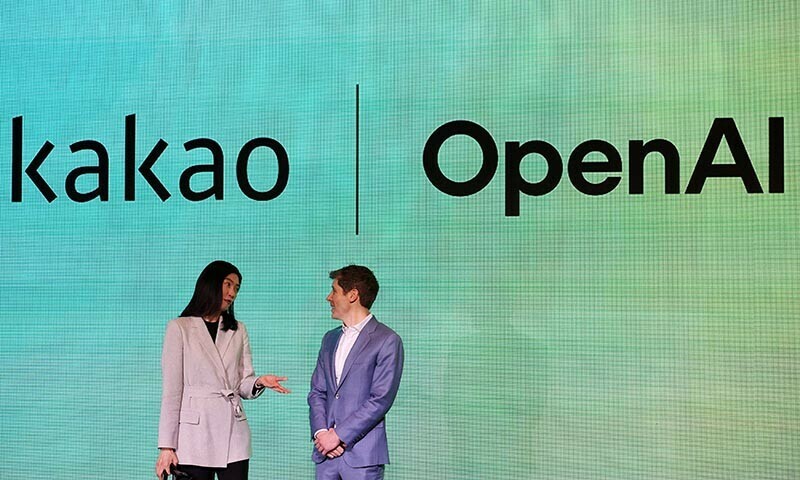Kakao’s Bold Move to Reignite Growth
South Korea’s tech landscape is seeing a major shift. Kakao Corp., the country’s internet and messaging giant, has officially formed a strategic partnership with OpenAI, signaling a turning point in its efforts to regain market momentum. Announced in early July 2025, the Kakao OpenAI partnership is more than a headline — it is a lifeline for a company facing intense domestic competition and slowing growth in its core businesses.
Kakao, best known for its super app KakaoTalk, has been struggling to innovate fast enough to keep up with emerging AI-first challengers like Naver and global players like Google and Microsoft. The partnership with OpenAI provides access to one of the most advanced AI platforms in the world, potentially opening up new paths for product development, user engagement, and global expansion.
According to Forbes reporter John Kang, the agreement enables Kakao to integrate OpenAI’s latest large language models, including GPT-5, into its suite of services. This includes messaging, e-commerce, mobility, and content platforms — all of which are central to Kakao’s digital ecosystem.
Why This Partnership Matters for South Korea’s AI Ecosystem
The Kakao OpenAI partnership is not just a corporate strategy; it also reflects a broader shift in the South Korean tech industry. While Korean companies have made major advances in hardware and semiconductor technologies, software and AI services have lagged in global competitiveness. Kakao’s move represents a recognition that in order to stay relevant, collaboration with global AI leaders is essential.
This is especially critical as the South Korean government pushes forward its national AI roadmap, aiming to become one of the top three global AI powerhouses by 2030. By partnering with OpenAI, Kakao gains not only technology but also credibility and access to best practices in AI deployment.
Kakao is reportedly planning to roll out AI features in KakaoTalk, such as smart replies, AI-assisted content curation, and voice-to-text services using OpenAI’s models. The company also wants to explore new products powered entirely by generative AI, including digital assistants for e-commerce and AI copilots for creators and developers.
In this context, the partnership is expected to accelerate the development of Korea’s domestic AI talent ecosystem, foster new startups, and drive forward the adoption of ethical AI standards — areas where OpenAI already has deep expertise.
Kakao’s Strategic Challenges and the Road to Reinvention
The need for reinvention could not be more urgent. Kakao has seen its market cap shrink significantly over the past two years due to regulatory scrutiny, competition, and leadership instability. Its entertainment subsidiary, Kakao Entertainment, has also faced backlash over pricing and transparency, while Kakao Mobility is under pressure from local ride-hailing startups and regulatory bodies.
By integrating OpenAI’s cutting-edge models, Kakao hopes to deliver a more personalized and responsive experience across its platforms. This could help reverse user fatigue, increase time spent in-app, and drive higher advertising and subscription revenues. The Kakao OpenAI partnership could also position Kakao as a global AI innovator, rather than a domestically-focused tech firm.
The company has already announced the establishment of a dedicated AI task force, which will work closely with OpenAI engineers to ensure smooth integration. In addition, Kakao’s investment arm is reportedly exploring joint ventures and co-investments in AI startups, creating a potential pipeline of innovation that extends beyond its own platforms.
However, challenges remain. Integrating OpenAI’s models into Korean-language applications will require significant adaptation and testing. Korean syntax, cultural nuance, and data privacy rules all present unique hurdles that Kakao must navigate to deliver seamless AI services. Moreover, the company must balance innovation with responsibility, particularly in areas like misinformation, AI bias, and user data protection.
Regional and Global Implications of the Partnership
The Kakao OpenAI partnership also has broader geopolitical and business implications. It strengthens ties between South Korea and the US tech ecosystem at a time when the AI race is becoming increasingly fragmented along regional lines. With China developing its own foundation models and the EU pushing for stricter AI regulations, partnerships like this one help to maintain technological alignment and shared standards across key allies.
For OpenAI, the deal provides valuable access to one of the most connected and mobile-savvy populations in the world. South Korea is a testbed for mobile innovation, with users quick to adopt new technologies. OpenAI can gain critical data and user insights from Korean consumers, which could help refine its models and expand its cultural relevance.
Furthermore, the deal could inspire similar partnerships across Asia. Companies in Japan, Taiwan, and Southeast Asia are closely watching how Kakao leverages this alliance, potentially triggering a wave of cross-border AI collaborations aimed at competing with China’s Baidu and Alibaba or the US tech giants.
This move also serves as a reminder that AI is not just a back-end tool but a strategic lever for business transformation. Companies like Kakao must move beyond traditional service models and embed intelligence into every part of the user journey — from messaging and payments to mobility and media.
Conclusion: A High-Stakes Bet on the Future
The Kakao OpenAI partnership is a high-stakes bet on the future of AI-powered consumer technology. For Kakao, it offers a chance to reclaim its position as a market leader, not just in Korea but on a global scale. For OpenAI, it extends its reach into one of Asia’s most dynamic digital economies.
Success will depend on execution: whether Kakao can translate cutting-edge AI into real value for users, while navigating regulatory, cultural, and technical challenges. If it succeeds, the partnership could become a blueprint for how regional tech companies collaborate with global AI leaders to accelerate innovation and redefine digital ecosystems.
Read More






 Thursday, 22-01-26
Thursday, 22-01-26







